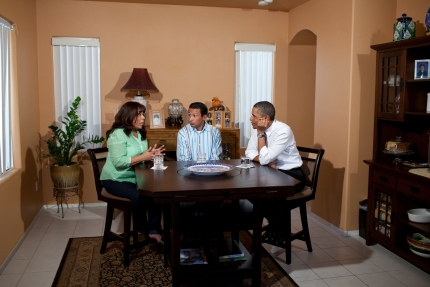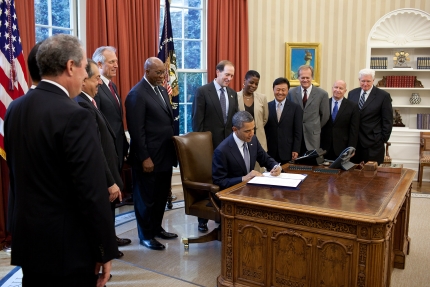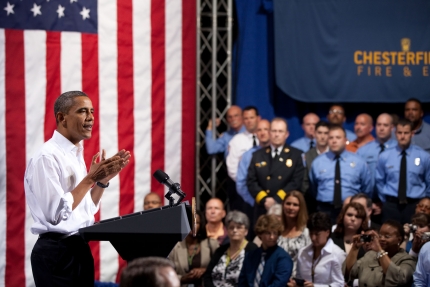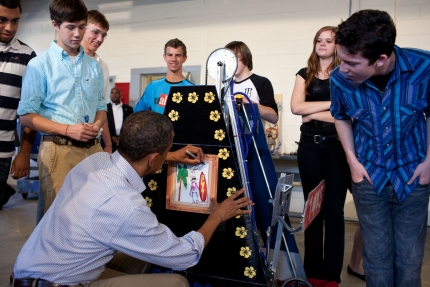Jobs News
Why Cancer Patients Can't Wait: "It Can Mean the Difference Between Curing Your Cancer and Not"
Posted by on October 31, 2011 at 7:00 PM ESTWatch Jay Cuetara, a cancer patient and advocate for drug shortage reform, speak about President Obama's executive action to reduce prescription drug shortages in America here.
President Obama today signed an executive order that directs the FDA to step up work to reduce the drug shortages and protect consumers. Jay Cuetara know just how important this is: in August, the center where he was receiving chemotherapy ran out of the drug being used to treat his cancer, which "can mean the difference between curing your cancer and not," the San Francisco man explained.
The President's action means that drug companies will be required to let the FDA know earlier about the potential for drug shortages so that they can respond successfully. If we find out that prices are being driven up because shortages are being made worse by manipulations of companies or distributors, agencies will be empowered to stop those practices. And the FDA and the Department of Justice will be investigating any kinds of abuses that would lead to drug shortages.
As the President said today, we can't wait for action. "We'll still be calling on Congress to pass a bipartisan bill that will provide additional tools to the FDA and others that can make a difference. But until they act, we will go ahead and move."
Update: Check out a video from Bonnie Frawley, a pharmacy manager from Boston, who talks about what the President’s order will mean for hospitals.
Learn more about Health CareWeekly Address: We Can’t Wait to Create Jobs
Posted by on October 29, 2011 at 4:30 AM ESTPresident Obama says that we can’t wait for Congress to take action to grow the economy and create jobs -- and highlights actions he took to help families refinance their mortgages, put veterans to work, and lower the cost of student loans.
Transcript | Download mp4 | Download mp3
Watch President Obama's full remarks here.
Learn more about Economy‘Lab to Market’ Initiatives Transforming New Ideas into New Jobs
Posted by on October 28, 2011 at 10:17 AM ESTToday, the President announced a new directive requiring all Federal research agencies to bolster efforts to transfer the results of research from their lab to the marketplace. These agencies will streamline their research partnership programs for small businesses, universities, and local communities. They will also launch new programs designed to support regional innovation clusters, launch new public-private partnerships, and share Federal lab facilities with high-tech startups. Each agency will be responsible for designing a five-year plan with tailored goals and metrics to measure progress.
Learn more about Economy, TechnologyMapping Out the American Jobs Act
Posted by on October 27, 2011 at 5:06 PM ESTThe American Jobs Act is a big proposal that can be hard to visualize, so we wanted to put together a new tool to help show the impact.
Our new map breaks down specific ways the President's plan helps to create jobs and put money back in families' pockets, state by state.
If you wanted to see what a typical tax cut looks like for a family in Texas, it's right here: $1,460.
Teacher jobs in North Carolina? 13,400.
Money for roads and bridges in Colorado? $494.8 million.
Take the time to dig in and learn how the American Jobs Act would help your state and community -- and share the map with those you know.
Learn more about EconomyAdvance Estimate of GDP for the Third Quarter of 2011
Posted by on October 27, 2011 at 8:39 AM ESTToday’s report shows that the economy posted the ninth straight quarter of positive growth, as real GDP (the total amount of goods and services produced in the country) grew at a 2.5 percent annual rate in the third quarter of this year. The level of real GDP now exceeds its level at the business cycle peak in the fourth quarter of 2007. While the continued expansion is encouraging, faster growth clearly is needed to replace the jobs lost in the recent downturn and to reduce long-term unemployment.
Notable strength in the third quarter included business investment, which grew 16.3 percent at an annual rate. Residential construction increased 2.4 percent at an annual rate, and was up 1.6 percent during the past four quarters, the first positive four-quarter percent change since 2006 except for a brief period when the home buyer tax credit was active. Positive contributions to real GDP growth included consumer spending (1.7 percentage point), fixed investment (1.6 percentage point), and net exports (0.2 percentage point). Inventory investment subtracted 1.1 percentage point from real GDP growth.
We are, nonetheless, at a fragile moment in the world economy, and cannot afford to do anything to undermine our economic recovery. That’s why the President continues to urge Congress to pass the American Jobs Act without delay. The American Jobs Act includes measures that would accelerate the recovery, including extending the payroll tax cut and unemployment insurance, keeping teachers in the classroom and police and firefighters on the beat, and investing in our nation’s infrastructure to help put Americans back to work. Independent economists say it could increase employment by up to 1.9 million, increase growth and lower the unemployment rate. This report also underscores the need to put in place a balanced approach to deficit reduction that phases in budget cuts, instills confidence, and allows us to live within our means without shortchanging future growth.
.
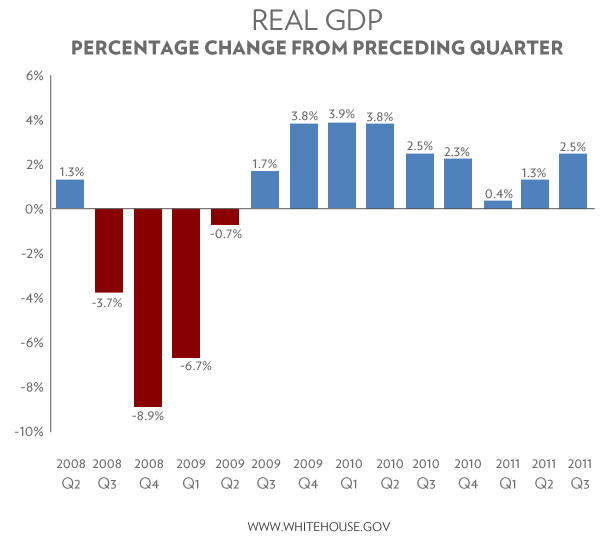 Learn more about Economy
Learn more about EconomyOffice Hours 10/25/11 or "We'll Keep Pushing": Brian Deese Answers Your Questions on Twitter
Posted by on October 26, 2011 at 10:00 AM ESTThis week, President Obama kicked off a new effort to urge Congress to pass the American Jobs Act, piece by piece, to put folks back to work and strengthen the economy. During a session of White House Hours, Brian Deese, Deputy Director of the National Economic Council, answered your questions about the Jobs Act and steps the President is taking to help homeowners refinance their mortgages.
See the full questions and answer session below, or on Storify.
Follow @Whitehouse for the latest from the Administration and upcoming opportunities to engage. Have ideas on how we can improve Office Hours or our online program? Share feedback with us using the hashtag #WHWeb.
Learn more about EconomyKeeping First Responders on the Job
Posted by on October 25, 2011 at 4:24 PM ESTTyrone Booth and Jesse Carpenter are police officers in Flint, Michigan -- where Vice President Biden visited earlier this month. Because of budget cuts, they've seen their department shrink since the start of the recession. In fact, at various times in recent years, each has been laid off from the force. Both are keenly aware of the ways in which these reductions have put public safety at risk.
Officer Booth says the Flint police must now prioritize the calls to which they respond. A shooting or an assault must come before a break-in or a burglary, which can be hard for citizens affected. "When someone's home has been burglarized, it's a very sensitive and serious offense to them,” he said. “And we're just unable to get there in a timely manner."
Watch:
Keeping Americans safe is a top priority for President Obama, which is why the American Jobs Act will provide $5 billion to help states and local communities keep first responders on the job. Earlier, Secretary of Homeland Security Janet Napolitano and Attorney General Eric Holder spoke at a gathering of the International Association of Chiefs of Police and discussed the Administration's support for the nation's fire fighters and police officers.
Read more here.
Learn more about EconomySupporting Law Enforcement Officers and First Responders Who Keep Our Nation Safe
Posted by on October 25, 2011 at 4:17 PM ESTEd. note: This has been cross-posted from DHS.gov
Keeping our nation safe from evolving terrorist threats requires strong partnerships at all levels. Nowhere are those partnerships more important than with our federal, state, local, and tribal law enforcement officers who work on the frontlines every day to keep our cities and communities safe.
These courageous men and women, who put their lives on the line to protect others, must have the tools, training, and resources they need to do their jobs safely and effectively.
This week at the International Association of Chiefs of Police (IACP) General Assembly in Chicago, we each had an opportunity to reiterate our support for police officers and first responders across our country, many of whom are struggling to hire or retain personnel in the face of tough economic challenges.
As part of ongoing work to better understand and overcome current fiscal challenges, this week, the Justice Department's Community Oriented Policing Services (COPS) office released a new report on how the economic downturn has impacted police departments nationwide. According to the Department's research, we expect that, by the end of this year, nearly 12,000 police officers and sheriff's deputies will have been laid off. Already, law enforcement agencies nationwide currently have nearly 30,000 unfilled vacancies. And an estimated 28,000 more officers and deputies experienced week-long furloughs last year. In 25 years of collecting data, this is the first national decrease in law enforcement positions ever recorded.
There is great demand for existing federal fire fighter hiring funding. In FY10 alone there were $1.8 billion in applications for $420 million in SAFER funds.
Learn more about EconomyWe Can’t Wait: Supporting Our Veterans
Posted by on October 25, 2011 at 9:53 AM ESTI think all Americans can agree that veterans shouldn’t have to fight for a job once they’ve come home from the fight overseas. But, all too often, those who have sacrificed so much for America struggle to find a job worthy of their talents. As the President has said, “if you can save a life in Afghanistan, you can save a life in an ambulance. If you can oversee millions of dollars of assets in Iraq, you can help a business balance its books here at home.” Ensuring our nation’s veterans get the opportunities they have earned has been one of President Obama’s top priorities as Commander in Chief.
That's why President Obama called for a new Returning Heroes Tax Credit of up to $5,600 for firms that hire unemployed veterans and a Wounded Warriors Tax Credit that will increase the existing tax credit up to $9,600 for firms that hire veterans with service-connected disabilities.These credits are included in the American Jobs Act. Unfortunately, these tax credits that could help companies hire veterans are held up in Congress.
While we will continue to work with Congress to bring up the American Jobs Act piece by piece, we will increase our focus on taking executive actions that fight for the middle class because the American people simply can’t wait. That’s why today, the Obama Administration is announcing two new initiatives to help create jobs for veterans.
1. Hiring 8,000 Veterans in Three Years: The Community Health Center Veterans Hiring Challenge
Today, the Obama Administration challenged Community Health Centers to hire 8,000 veterans – approximately one veteran per health center site – over the next three years. The National Association of Community Health Centers will also contribute to this effort and joined the Administration in announcing this Community Health Center Veterans Hiring Challenge.
2. Helping Veterans Become Physician Assistants
Under this initiative, the Administration will make it easier for veterans to use the training they have received in the military to become physician assistants. We will begin to give priority in physician assistant grant awards to universities and colleges that help train veterans for careers as physician assistants. In an effort to expand the number of training programs that accommodate veterans, the Administration also will identify model programs that offer expedited curricula for veterans and that offer enhanced veteran recruiting, retention, and mentoring services, and help bring these best practices to other programs.
These efforts build on previous Administration efforts to create jobs for veterans including sending 600,000 veterans back to school on the Post-9/11 GI Bill and hiring over 100,000 veterans into the federal government over the past year and a half. And just last week, First Lady Michelle Obama announced that the American Logistics Association (ALA) and their 270 affiliate companies committed to hiring 25,000 veterans and military spouses by the end of 2013. This commitment is part of the First Lady and Dr. Jill Biden’s Joining Forces initiative to support veterans and military families. The ALA’s commitment will fulfill a quarter of the President’s challenge to the private sector to hire or train 100,000 veterans and military spouses by the end of 2013.
This work is also happening across the federal agencies.The Departments of Defense and Veterans Affairs, are working closely with other agencies and the President’s economic and domestic policy teams, to lead a new task force to ensure that every member of the military receives the training, education, and credentials they need to transition to the civilian workforce or to pursue higher education. This initiative includes the design of a “Transition Boot Camp,” which will give service members additional counseling and guidance and help them depart their active duty service “career-ready.”
Over the weeks and months ahead, we’ll continue to take actions like these that will improve the economy and help middle class families including our nation's veterans because we simply can't wait.
President Obama also can't wait for Congress to:
We Can't Wait: President Obama in Nevada
Posted by on October 24, 2011 at 5:27 PM ESTLast week, Republicans in the Senate blocked a jobs bill that would have meant jobs for around 400,000 teachers and first responders. Twice.
This week, President Obama is back on the road with a new message, which today, he shared with a crowd in Nevada:
So I'm here to say to all of you -- and to say to the people of Nevada and the people of Las Vegas -- we can’t wait for an increasingly dysfunctional Congress to do its job. Where they won't act, I will.
Instead of waiting for Congress to fix No Child Left Behind, the President directed his administration to move forward with a plan to give states the flexibility they need to help students meet higher standards. The Administration acted to cut dramatically the time it takes for small businesses who contract with the federal government to get paid. And last week, the President eliminated outdated regulations that will save hospitals and patients billions of dollars in the years ahead.
Now, President Obama is taking on housing.
Learn more about EconomyFlint Mayor: American Jobs Act Will Help Long-Term Economic Growth
Posted by on October 24, 2011 at 1:34 PM ESTFlint Mayor Dayne Walling said that the American Jobs Act is crucial to our country’s long-term economic growth. “We have to have education, we have to have safe communities, we have to have small businesses that are growing, exporting, creating jobs,” he said.
The American Jobs Act addresses all these issues. It will help retain and hire hundreds of thousands of teachers, keep first responders on the job, and invest in small businesses across the country.
See what other mayors are saying about the American Jobs Act.
Mayor Antonio R. Villaraigosa of Los Angeles, California
Mayor Stephanie Rawlings-Blake of Baltimore, Maryland
Mayor Michael Hancock of Denver, Colorado
Mayor Greg Fischer of Louisville, Kentucky
Mayor Sly James of Kansas City
Mayor Mark Mallory of Cincinnati, Ohio
Mayor Phil Gordon of Phoenix, ArizonaLearn more about EconomyWe Can't Wait To Help Homeowners Refinance Their Mortgages
Posted by on October 24, 2011 at 1:04 PM ESTIn a typical recession, this is how you expect a recovery to get its legs: Growing families begin to invest in new homes. That investment works its way through the economy. Builders, suppliers, realtors, and the broader community all benefit.
Today, that isn't happening.
In 2006, the median home price in the United States was $227,100. By May of this year, that price had fallen to $158,700.
Already, at least 5 million people have lost their homes due to foreclosure, and today, one in every three homes purchased is the product of a short sale or a foreclosed property.
Worse still, across the country, nearly 11 million owe more than their property is worth.
Millions of these people have done everything right. They've paid all their bills and kept current on their home loans. But right now, they're stuck with higher payments because their mortgages are underwater. They're not eligible to refinance because the decline in home prices have made their property worth less than what they owe. And that's a problem President Obama knows must be addressed.
All of these factors have contributed to a climate where new homes are being built at the lowest rate since World War II and where homeowners feel trapped by financial circumstances outside their control. Those two things together are holding back the recovery.
We can't wait to help homeowners. The situation is too serious, and too much good can come from improving the state of housing in this country.
So today, President Obama is taking action. It starts with finding ways to allow homeowners to refinance their mortgages.
The Home Affordable Refinance Program is designed to do just that. To date, it's already helped nearly 1 million homeowners improve their financial situations. But up until now, eligibility regulations and costs associated with the program have kept it from having a wider impact.
Now, a new set of rules will open the program to nearly anyone with a mortgage backed by Fannie Mae or Freddie Mac -- no matter what they owe -- so long as they are current on their payments, have no late payments in the last six months, and have not made more than one late payment in the past year.
The group that manages the program, the Federal Housing Finance Agency, will also waive a set of unnecessary costs and fees that were dissuading some from taking advantage of the program and work to get rid of certain restrictions in order to increase competition among lenders.
Millions of individuals could see up to $2,500 in savings every year.
But good as this program might prove to be, alone it won't be enough. The thing that pushes most homeowners into foreclosure is unemployment. Knowing that, Congress still has the opportunity to pass a housing program with sweeping potential -- the American Jobs Act.
Until they do, President Obama isn't waiting on lawmakers to take action. Today's announcement is just the start of things this Administration will do to get the economy growing again -- even if Congress refuses to make jobs a priority.
President Obama also can't wait for Congress to:
- Reduce prescription drug shortages
- Help businesses grow
- Lower monthly student loan payments
- Help America's graduates
- Put veterans back to work
Learn more about Economy,Weekly Address: Bringing Home Our Troops
Posted by on October 22, 2011 at 4:30 AM ESTPresident Obama discusses how the death of Moammar Qadhafi in Libya and the announcement that troops from Iraq will return home by the end of the year are strong reminders that the United States has renewed its leadership in the world.
Transcript | Download mp4 | Download mp3
Watch President Obama's full remarks here.
The American Jobs Act by the Numbers: 1,500
Posted by on October 21, 2011 at 7:28 PM EST
Following the Senate vote on jobs for teachers and first responders, President Obama made clear that blocking action on getting Americans back to work is unacceptable:
For the second time in two weeks, every single Republican in the United States Senate has chosen to obstruct a bill that would create jobs and get our economy going again...We must do what’s right for the country and pass the common-sense proposals in the American Jobs Act.
Every Senate Republican voted to block a bill that would help middle class families and keep hundreds of thousands of firefighters on the job, police officers on the streets, and teachers in the classroom when our kids need them most.
Those Americans deserve an explanation as to why they don’t deserve those jobs – and every American deserves an explanation as to why Republicans refuse to step up to the plate and do what’s necessary to create jobs and grow the economy right now.Inaction won't work for American families that are just scraping by. President Obama intends to keep working with Congress to bring up the American Jobs Act piece by piece. That's why this week we're pulling out different aspects of the bill to show how it will impact you, like the expansion of the payroll tax cut passed last year that will provide a $1,500 tax cut to the typical American family in 2012.
Learn more about EconomyPresident Obama Signs Historic Legislation Signaling Progress on Trade and Jobs
Posted by on October 21, 2011 at 9:04 AM ESTThis morning, President Obama signed legislation implementing three job-supporting trade agreements with Korea, Colombia, and Panama. These trade agreements will help put Americans back to work and grow America’s economy.
At the same time, the President signed legislation renewing Trade Adjustment Assistance (TAA) that helps workers who have been hurt by increased global competition. He also signed legislation to renew trade preference programs that sustain the United States’ commitment to trade and economic development that lifts up some of the world’s poorest people.
With all the stories and speculation flying around the news these days, I know it’s hard to separate fact from fiction sometimes. So let me share three quick points that I hope will help you understand why this is good news for all American workers and families.
First, these agreements will increase U.S. exports and American jobs. The Korea agreement will support an estimated 70,000 U.S. jobs and increase U.S. GDP by at least $11 billion due to increased exports of goods alone. Chances are you’ll benefit from these agreements if you work for or with anyone who makes, grows, or provides goods and services to Korea, Colombia, or Panama. These agreements make it easier and more cost-effective to sell Made-in-the-USA products to consumers in each of these countries. In turn, increased exports of U.S. goods and services will support more and better jobs for farmers, ranchers, manufacturers, service providers, workers, and businesses all across the United States. And all three agreements have groundbreaking protections for labor rights, the environment, and intellectual property, so American workers and businesses will be able to compete on a level playing field.
Second, the President worked to improve these agreements when he came into office. All three faced significant opposition from Congress. But instead of surrendering to the status quo, the President told me to get to work. With Korea, he sent me back to the negotiating table to secure additional market access for U.S. automobile manufacturers. With Colombia, he stood firm on the principle that U.S. trade agreements must reflect American values, including respect for and protection of workers’ rights. And with Panama, he made sure that we addressed key concerns related to tax transparency and labor conditions. In each case, the President held out for a better, more balanced deal.
That brings me to the third and final point: President Obama also signed today legislation that strengthens and streamlines TAA, and renews key preference programs –- the Generalized System of Preferences (GSP) and the Andean Trade Preference Act (ATPA). Both TAA and our preference programs are key elements of President Obama’s balanced approach to trade. TAA helps those workers whose jobs are displaced by trade by providing job re-training programs, lower health insurance premiums, and assistance that keeps families on their feet. And GSP and ATPA uphold our commitment to support trade and economic growth that lifts up some of the world’s poorest people while helping American businesses get inputs they need and American consumers.
It’s important to note that Congress approved these trade measures with significant support in record time. In fact, the Korea agreement received more recorded votes than any free trade agreement in history. I think that’s a good indication that the President’s principled and pragmatic leadership has created a more balanced trade policy –- one that holds the promise of open markets and a level playing field with increased U.S. exports and better American jobs for many years to come. And since President Obama has prioritized enforcement of America’s trade agreements since day one, Americans can also be assured that we’ll hold our trading partners accountable for their obligations moving forward.
President Obama’s historic action today is a big step forward on trade and jobs. We look forward to working with Congress and the American people to continue pursuing a balanced trade policy that keeps American producers competitive abroad and supports jobs for more hard-working Americans here at home.
Learn more about Economy, Foreign PolicyAmerican Jobs Act by the Numbers: Zero
Posted by on October 20, 2011 at 6:35 PM EST
Over the last few days, President Obama traveled through small towns and communities on the American Jobs Act Bus Tour, talking with folks about how the American Jobs Act will fuel economic growth, get people back to work and put more money in the pockets of those who are working without adding to our deficit.
By rebuilding America's infrastructure, modernizing America's schools, providing tax credit incentives for hiring veterans and more, the American Jobs Act will begin creating jobs right away, if Congress answers the President's call to pass each piece of the bill. That is why we're featuring numbers that highlight how sections of the bill will impact you. Today's number is zero -- the amount added to the deficit by the American Jobs Act, because it is paid for in full.
As the President has said, we can invest in our long term prosperity without adding to the deficit:
I laid out a plan to pay for the American Jobs Act, and then some -- a plan that not only pays for the bill to put folks back to work to raise our growth rate, but to also pay down more of our debt over time. It builds on the $1 trillion in spending cuts that I already signed this summer, making it one of the biggest spending cuts in history.
So, look, I believe we’ve got to make cuts in programs that don’t work and things that aren’t helping the economy grow so we can pay for the things that are. Right? We all believe that a government needs to live within its means. We all agree with that. But we also believe that how you bring down the deficit is important. If we want to actually close the deficit -- not just talk about closing the deficit, not just using it for a campaign slogan, not just playing politics -- if we want to actually close the deficit, then you’ve got to combine the tough cuts with a strategy to ask the wealthiest Americans and the biggest corporations to do their part, to pay their fair share.
Learn more about EconomyThe American Jobs Act Bus Tour: President Obama at Fire Station 9
Posted by on October 19, 2011 at 4:34 PM ESTIn Chesterfield, Virginia, President Obama stopped by Fire Station 9 to talk about the challenge facing police and fire fighters across the country.
In too many communities, local governments have made the choice to respond to tough economic times by cutting police forces and scaling back fire stations. Speaking to a crowd that included around 100 first responders, the President called the situation "dangerous":
Now, Chesterfield has been lucky. It isn't facing layoffs right now. But a lot of these guys have seen their pay frozen. You've got cities and states like Michigan and New Jersey that have had to lay off big chunks of their forces. That means that firefighters can't always get to fires before they become major fires. And that makes their job more dangerous. It means police officers can't respond to every crime. And when giving our children the best education possible we know is the ingredient for success in this new information and technology-rich economy, how can we be laying off teachers -- when other countries are hiring teachers in droves? It's unfair to our kids. It undermines our future.
The first piece of the American Jobs Act -- a $35 billion proposal to help keep teachers and first responders on the job-- is designed to tackle that problem and ensure that public safety isn't put at risk.
It is currently in the Senate.
And in Chesterfield, President Obama pressed Congress to take action right away:
[If] they vote against these proposals, if they say no to steps we know that will put people back to work right now, they're not going to have to answer to me -- they're going to have to answer to you. They're going to have to come down here and tell folks in Virginia and all across the country why people are going to have to cope with fewer first responders; why your kids can’t have teachers back in the classroom. They’re going to have to look construction workers in the eye and tell them why they’re sitting idle instead of rebuilding infrastructure that we know needs to be rebuilt.
Today, Senator Harry Reid, the Majority Leader, announced that the legislation could see a vote as soon as Friday.
Learn more about Economy,Virginia Computer Teacher Supports Science and Engineering Education
Posted by on October 19, 2011 at 3:03 PM ESTTracy Ellis teaches robotics and computer classes at Bluestone High School in Mecklenburg County, Virginia, one of the stops on President Obama's American Jobs Act Bus Tour this week. Ellis supports President Obama’s jobs plan because the investments in school infrastructure and modernization will help his students access the tools they need to train for 21st century jobs.
Ellis said that computers play an important role in our society. Everyone has one, but no one is willing to open them up and fix them if something goes wrong, he said. He teaches his students to repair computers and address many of the problems computer users encounter, which he says is a valuable skill that gives them practical experience for future careers. His more advanced classes are even responsible for providing technical support for the school’s computers.
Ellis also teaches an afterschool robotics program that attracts 25 to 30 students each school year. He said the robotics program is a great way to get students involved in science and engineering who might not otherwise be interested, especially female students. Six other teachers as well as engineers from the community help students build a robot each spring, which they enter in competitions with other schools. President Obama met the team’s robot, Skrappy, when he visited Bluestone yesterday.
Vice President Biden Talks About the American Jobs Act with First Responders
Posted by on October 19, 2011 at 2:40 PM ESTYesterday, the Vice President traveled to Philadelphia to participate in a roundtable about the American Jobs Act with Chiefs of Police from the region.
Alongside Philadelphia Mayor Michael Nutter, Director of the Office of National Drug Control Policy Gil Kerlikowske, and more than 10 local police chiefs, the Vice President underscored how the piece of the American Jobs Act the Senate is considering this week would put thousands of cops back on the job.
“I call on the members of Congress to step up this week. Step up and make a choice. Make a choice. Make a choice for the people in your district. Should they have more teachers back in school? Should they have more police on the beat? Should they have firefighters in the firehouse? Or should you save a millionaire from a $500 tax? Ladies and gentlemen, it's that basic and that simple.”
The Chiefs told the Vice President about the devastating impact budget cuts have had on their communities. Chief Scott Thomson of Camden, NJ, had to lay off 168 officers – nearly half of his force – in January of this year. In the wake of those layoffs, Camden has seen a 14 increase in violent crime, and homicide has risen 30 percent.
The story echoed what the Vice President heard last week in Flint, Michigan – a city that has also seen an uptick in crime and a significant increase in police response times after cutting their police force in half since 2008. Today, we released a video that shows what Flint’s first responders say the impact of the American Jobs Act would be:
Learn more about Economy, Homeland SecurityThe American Jobs Act Bus Tour: "An American Responsibility"
Posted by on October 19, 2011 at 2:08 PM ESTThis morning, President Obama visited Joint Base Langley-Eustis in Virginia to talk about what he calls an "American responsibility" -- honoring and supporting our nation's veterans.
He was introduced by the First Lady, Michelle Obama, who joined the American Jobs Act Bus Tour to make an announcement as part of the Joining Forces initiative. Mrs. Obama told the soldiers, airmen, and military spouses gathered at Langley-Eustis that too often potential employers fail to recognize the skills and talents that veterans and military families can bring to a job -- but, she said, this is a trend that can change:
[Today], I am proud to announce that the American Logistics Association has said they’re going to step up and do something about that. So today they’re committing to hiring 25,000 veterans and military spouses in the next two years. They do not want to miss out on your potential. They want America’s businesses to have the best, most talented, most hardworking employees around. Now, this announcement is a huge deal -- which is why the President is here...This commitment includes 270 companies of all shapes and sizes, which makes this the largest coordinated effort by the private sector to hire veterans that we’ve seen in years. And this commitment puts us a quarter of the way toward reaching the President’s challenge to the private sector to hire or train 100,000 vets and military spouses by the end of 2013.
The President discussed an another initiative to get those who served in our nation's Armed Forces into the civilian workforce -- a series of tax credits for employers who hire veterans that's part of the American Jobs Act. He told the crowd that he was going to push Congress to vote on the proposal:
And one of the votes I’m going to urge members of Congress to take is on whether or not they think it’s a good idea to give companies an incentive to hire the men and women who have risked their lives for our country. And I’m hopeful we can get both parties on board for this idea. When I first proposed this idea in a joint session of Congress, people stood up and applauded on both sides of the aisle. So when it comes for a vote in the Senate, I expect to get votes from both sides of the aisle. Don’t just applaud about it, vote for it. Vote for it.
"Standing up for our veterans," President Obama said, "is not a Democratic responsibility or a Republican responsibility. It is an American responsibility."
- &lsaquo previous
- …
- 8
- 9
- 10
- 11
- 12
- 13
- 14
- 15
- 16
- …
- next &rsaquo


